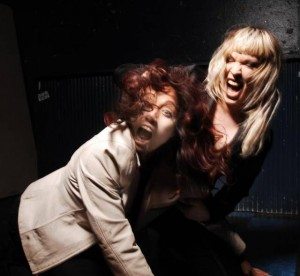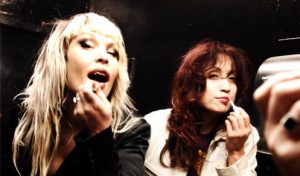
 Cover bands generally have a stigma, most oftentimes justified by being the burnt out middle age group that somehow stepped onto the stage at the local bar in your hometown to half drunkenly change tempos eight different times in renditions of their favorite 80’s songs. The cheesy faux rock star identity adopted by the claims adjuster from the next town over is the common source of a cringe we have all experienced at some point. Some may call The Detroit Cobras a cover band, but this description would far, far from accurate.
Cover bands generally have a stigma, most oftentimes justified by being the burnt out middle age group that somehow stepped onto the stage at the local bar in your hometown to half drunkenly change tempos eight different times in renditions of their favorite 80’s songs. The cheesy faux rock star identity adopted by the claims adjuster from the next town over is the common source of a cringe we have all experienced at some point. Some may call The Detroit Cobras a cover band, but this description would far, far from accurate.
Making older songs their own, guitarist Mary Restrepo and vocalist Rachel Nagy would be the last one to call themselves a cover band. Mary spoke with us regarding how to reinvent these classics, what makes a song great, and accidentally covering The Beatles.
Stagebuddy: When I first listened to Tied & True I recognized a few of the songs, but was blown away to learn that they are all covers. How do you go about making these 40 to 50 year old songs sound convincingly original?
Mary Restrepo: I would say just pure love, man. When you like a song, you can really just embrace it. A perfect example of that is when you go see a band, especially one that you don’t know that well, and they pull out a cover. The band suddenly picks up and they take off, because they understand it. They know the song, and they love it, so when it’s time to do an original, they already know what they want because they’ve made an original version of a cover. We’ve done an original that we put in the middle of a group of songs. People still ask us in interviews when we’re going to write an original, and we say, “we already did.” They can’t tell which one it is, but we just wanted to prove that we could do it. Other than that we don’t really think we care, we already know we’re not geniuses. We just love music, and if you complain about the radio, just play what you want to hear.
Though you are a cover band, you’re not the band playing “Don’t Stop Believing”.
From what I understand, a cover band is a band that plays tunes so that you recognize them and don’t get bored. I mean, Elvis and Aretha didn’t write their own music, but no one calls them cover artists. The greatest thing pop music has going for it is that they maintain that they don’t have to write their own songs. I think every band should do a cover tune to keep themselves in check.
That used to be a necessity for a band, to have some covers in their repertoire. Do you feel that notion is completely lost nowadays?
I think a lot of those bands did it because people would recognize the songs. If you look at the sixties, all the bands seemed to do the same cover. We do material. From the first record we put out, unless we told you they were covers, a lot of people wouldn’t have known. There would have been no difference if I had gotten the songs from the mailman or the garbage dude. What we do is material, whereas a cover band does songs solely so people will recognize them.
Any negative criticism stemming from playing covers I feel is unfair, because the best classical violin player in the world is still playing someone else’s music but not taking flack for it.
Exactly! You should just dismiss the whole classical genre if you need something to be constantly original. (Laughs) To me it’s just so silly because it’s all about making good music. For me, it was always about making good records. I don’t think people grasped Tied & True as much as I did, and there are actually two versions of that album in different sequences. We had so many ideas that we did the UK sequence, which is kind of slow starting before building up, and the American version, which starts off with a fast song and is more like a show set. When we made the record and I wanted to change the order, not only was the mastering engineer working for free, but he mastered is two different ways for me.
With having this idea of the songs working together in different orders while maintaining a consistency throughout, how do you pick songs from such different backgrounds that go well together?
A lot of that has to do with Rachel being able to sing them. We both have the same tastes though to a certain degree. It’s more though that we both think alike, which is actually more important than having the same tastes. It really all comes down to the old adage that a good song is a good song. If you have all great songs, they naturally line up well together.
Is there a similar ingredient that each of these songs has to make it great?
The lyrics definitely have to be good. We’ve come across songs that are great musically, but the lyrics are so stupid we just know we couldn’t do that. We’re never going to sing a song called “My Ding-a-Ling”. Rachel has to feel it when she sings because you can’t fake that. You’ve got to feel a certain way about the music, regarding the groove and chord changes. You need to have good chord changes, not to say that two chord songs doesn’t have good changes, but when you hear a good one you know it. Everybody has chords that they love, musically and not. If you have a girlfriend, you know that saying things a certain way will maker her not yell at you as much. When you listen to music, you will react to certain changes in the same way. When you buy a new coat you think, “this is pretty cool.” But when you go home it may not feel right, until one day when you put it on and you know exactly what to do with it. You have the most confidence of how you are going to wear it and put it on body, even though it’s been the same body the whole time! In your mind though, you now know what to do with it, and it’s the same thing with songs. You have to pick your own songs too. We once had a request to cover “I’m Into Something Good”, but when Rachel sings, it comes out as “Something tells me I’m going to beat the hell out of you.” You just can’t fake these kind of things.
 In embracing that, you’re able to completely change a song. In something like “Leave My Kitten Alone”, the effect is very different from the 1959 original and when two badass women front the band playing it in 2014. Do you look for songs that have that capability?
In embracing that, you’re able to completely change a song. In something like “Leave My Kitten Alone”, the effect is very different from the 1959 original and when two badass women front the band playing it in 2014. Do you look for songs that have that capability?
It’s funny you should mention that one. When we were recording the song, we knew it being by Little Willie John. We love Little Willie John, and he’s even from Detroit. In the recording of it, we have some “meows” for fun in the background that I had called in some friends to do. One of them says, “Oh you’re doing that Beatles song.” Rachel and I turned to each other and said, “We did what?!” Rachel’s one of those I-hate-The-Beatles-but-knows-every-word people, but at this point it was way too late to cut it from the record anyway.
Rachel has always said that being a musician was never her plan and that she never dreamed of this as a child. How are you similar or different in this way?
When I met Rachel it was because I tripped on her at a bar, so when she says she “fell” into it, she’s not kidding, man. (Laughs) I think there’s something to be said for how girls and guys as kids listen to music differently. When you’re a girl, if you came across a cool guy, he would make you a mixtape. I’ve thrown away pictures of old boyfriends, but I will not throw away those mixtapes. Rachel was classically trained on piano, but I was a runaway kid and guitar was just a way to keep my mind off of what was going on.
You operate under the blurred genre lines of garage rock and punk, which are styles that typically go against the previous generation’s music. You seem though to be rebelling against the modern music. What inspired this?
Bad radio, basically. In the 70s, people were influenced by what was on the radio and then they started bands. There’s so little of anything good on the radio these days though. I need some rock ’n’ roll.
You can catch The Detroit Cobras twice next week, on 12/30 at The Bowery Electric and 1/2 at Baby’s All Right.